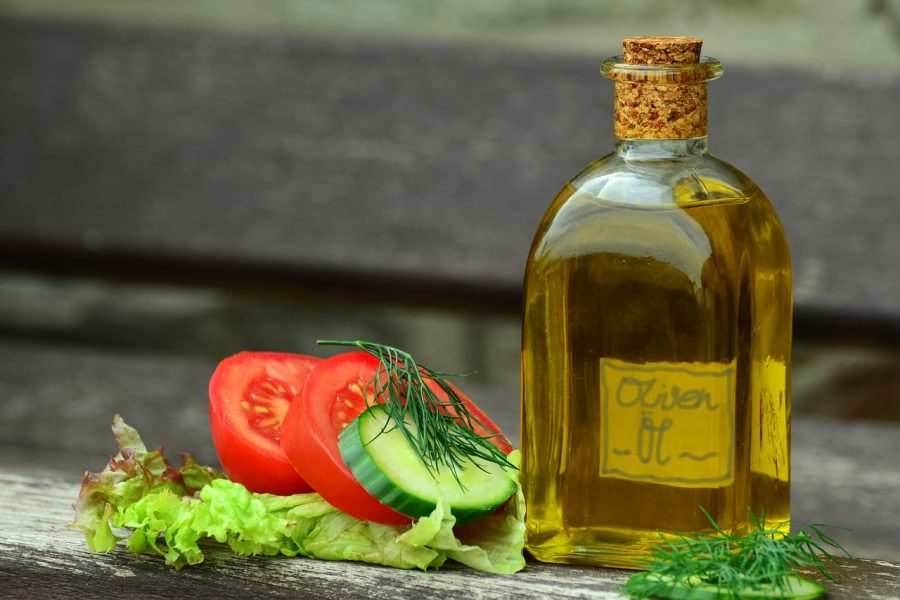
So, what’s the best type of olive oil for your health?
If you’ve ever used a fine quality olive oil in a salad dressing or drizzled it over a warm winter stew, then you know how a great olive oil has the ability to brighten up any dish.
What makes an olive oil taste good?
“Appreciate the recipes: a great resource that sits on my kitchen counter.” – Sarah L. Order your copy now.
First and foremost — how it’s processed:
- If you buy virgin or extra-virgin olive oil at the store, you’re purchasing oil that has not undergone any chemical treatment.
- When oil is refined, this means that chemicals have been used to remove taste and to neutralize acid content.
- Any oil that reads pure olive oil is typically a blend of virgin and refined olive oil.
Refined olive oil is considered to be of lesser quality than extra-virgin olive oil. Not only have the natural flavors of the olive been removed, but chemicals are used in its processing.
The grassy, sometimes fruity notes that a good olive oil can carry in flavor are desirable. It’s also the mark of high-quality oil.
Besides flavor, there’s another reason why you want to spend a little extra time locating good-quality olive oil: your health.
Many people consider olive oil to be one of the healthiest oils available. And the research shows that olive oil may indeed be beneficial to the heart, depending on how you consume it.1 Using olive oil correctly means that you understand its monounsaturated nature.
Olive oil is made up of monounsaturated fatty acids. A fatty acid is just another way of saying a fat molecule. Because olive oil is monounsaturated, this means that it’s not as delicate as flax oil or the oil from cold-water fish, which are polyunsaturated. However, as an unsaturated oil, it still will oxidize and go rancid under the right conditions.
There are several reasons why you do not want to cook with olive oil. Unsaturated fats, whether monounsaturated or polyunsaturated, are most likely to oxidize in certain environments. So, what causes unsaturated fatty acids to oxidize?
Three things:
1. Air
2. Heat
3. Light
This is why extra-virgin olive oil has the potential to taste so delicious: because it’s been minimally processed and exposed to the least amount of light, air, and heat.
If your olive oil does not have flavor, then it’s been overly processed, and it’s most likely doing more harm than good in your body. Unfortunately, the same is true if you cook with olive oil. Many people cook with olive oil because it’s a “heart-healthy” oil, but olive oil should not be used at high temperatures.2
Choose health: Click here to learn more about our best-selling products.
Is cold-pressed or ice-pressed a better pick?
You’ll find that the olive oil with the most nuance of flavor may also be most helpful to your health. Light, air, and heat can all potentially damage an unsaturated oil and affect its flavor.
“Cold-pressed” is not exactly what you would imagine:
- When extra-virgin olive oil is cold-pressed, this means that it’s exposed to temperatures ranging from 35° to 55° Celsius (95° to 131° Fahrenheit).
- Cold-pressing an oil decreases the yield, but it increases flavor and nutritional value.
- This is why cold-pressed oils are generally more expensive on the shelf.
“Ice-pressed” is exactly as the name implies:
- Ice-pressed olive oils are exposed to temperatures ranging from 0° to 5° Celsius (32° to 41° Fahrenheit).
- This production method almost entirely preserves both the flavor and the nutritional value of olive oil.
- One ice-pressed oil that has impressed us is Rallis Olive Oil. Use our exclusive discount code BODY20 to get 20-percent off when you purchase.
Most of us know that certain fats are good for us, especially olive oil. But did you know that good-quality fats can supply your body with a steady source of energy throughout the day?
We often reach for carbohydrates when we’re looking for energy. But a carb-rich diet may lead to far more fluctuations in blood sugar than a diet that is rich in healthy fats. Olive oil may help decrease risk of type 2 diabetes, ease pain associated with rheumatoid arthritis, and even protect against Alzheimer’s.3-5
So, go ahead: Feel good about eating healthy fats and know that by choosing the absolute best quality, you’re protecting and nourishing your body.
REFERENCES:
- 1. Rebecca L. Charles, Olena Rudyk, Oleksandra Prysyazhna, Alisa Kamynina, Jun Yang, Christophe Morisseau, Bruce D. Hammock, Bruce A. Freeman, and Philip Eaton. Protection from hypertension in mice by the Mediterranean diet is mediated by nitro fatty acid inhibition of soluble epoxide hydrolase. PNAS, May 2014 DOI: 10.1073/pnas.1402965111.
- 2. Sutherland WH, de Jong SA, Walker RJ, Williams MJ, Murray Skeaff C, Duncan A, Harper M. Effect of meals rich in heated olive and safflower oils on oxidation of postprandial serum in healthy men. Atherosclerosis. 2002 Jan;160(1):195-203. doi: 10.1016/s0021-9150(01)00561-5. PMID: 11755938.
- 3. Salas-Salvadó J, Bulló M, Babio N, Martínez-González MÁ, Ibarrola-Jurado N, Basora J, Estruch R, Covas MI, Corella D, Arós F, Ruiz-Gutiérrez V, Ros E; PREDIMED Study Investigators. Reduction in the incidence of type 2 diabetes with the Mediterranean diet: results of the PREDIMED-Reus nutrition intervention randomized trial. Diabetes Care. 2011 Jan;34(1):14-9. doi: 10.2337/dc10-1288. Epub 2010 Oct 7. Erratum in: Diabetes Care. 2018 Oct;41(10):2259-2260. PMID: 20929998; PMCID: PMC3005482.
- 4. Berbert AA, Kondo CR, Almendra CL, Matsuo T, Dichi I. Supplementation of fish oil and olive oil in patients with rheumatoid arthritis. Nutrition. 2005 Feb;21(2):131-6. doi: 10.1016/j.nut.2004.03.023. PMID: 15723739.
- 5. Elisabetta Lauretti, Luigi Iuliano. Extra-virgin olive oil ameliorates cognition and neuropathology of the 3xTg mice: role of autophagy. Annals of Clinical and Translational Neurology, 2017; DOI: 10.1002/acn3.431.










